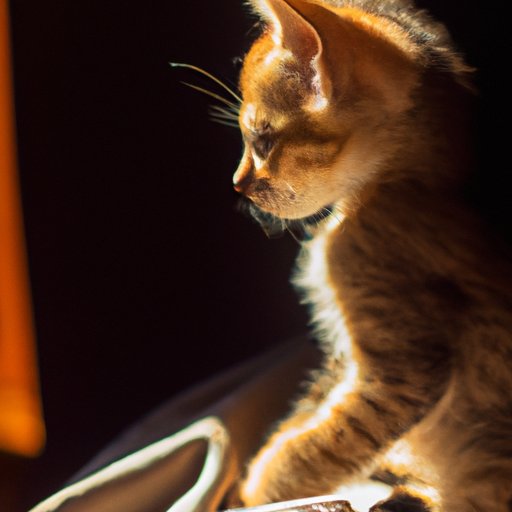
I. Introduction
If you’re a cat owner, you may have experienced the comfort of your feline friend during times of sadness or stress. I remember feeling particularly down after a breakup and my cat jumped onto my lap and began purring loudly, bringing a sense of calmness to my heart. But do cats really know when we’re sad or are they just seeking attention? Let’s explore the science behind feline empathy.
II. The Science Behind Feline Empathy
According to animal behaviorists, cats can pick up on human emotions based on subtle changes in our body language, tone of voice and pheromones. They’re also very sensitive to our routines and can sense when we’re acting differently than usual.
“Cats are very good at reading human body language and can pick up on even the subtlest changes. They’re also attuned to the energy of a room and can sense when something is off,” says Dr. Jane Brunt, Executive Director of the CATalyst Council.
III. Studies on Feline Empathy
Several studies have shown that cats do indeed recognize when their humans are feeling sad. In one study conducted by researchers at the University of Lincoln, cats were presented with their owners’ voice recordings as well as the voice recordings of strangers. The cats spent more time listening to their owners’ recordings and exhibited more positive behaviors in response to them.
Another study published in the Journal of Veterinary Behavior found that cats exhibited more affectionate behavior towards their owners when they were in a negative mood.
IV. How Cats Respond to a Sad Human
So how do cats respond when their humans are sad? Some cats may offer comfort by snuggling close or even nuzzling their humans’ faces. Others may bring toys or treats as a way to cheer them up.
However, it’s important to note that not all cats react to sadness in the same way. Some may become more aloof or may even exhibit stress-related behaviors such as excessive grooming or hiding.
V. Anecdotal Evidence of Feline Empathy
Many cat owners have shared stories of their furry companions showing empathy towards them during trying times. One Redditor even shared a story of their cat comforting them after a traumatic event, saying “My cat very clearly sensed that I was upset. She crawled up onto my chest, rubbed her face against mine and began to purr. It was like she knew exactly what I needed in that moment.”
VI. Tips for Cat Owners
If you’re a cat owner, there are several ways you can provide comfort to your feline friend during times of sadness or stress. Creating a calm environment with quiet music, dimmed lights and comfortable bedding can help reduce stress for both you and your cat.
Dr. Brunt also suggests maintaining consistent routines for your cat. “Cats thrive on routine and can become stressed if their normal routines are disrupted. Try to keep their feeding and playtime schedules consistent,” she advises.
VII. Limitations of Our Understanding
Despite the evidence suggesting that cats can pick up on human emotions, there is still much we don’t know about feline behavior and emotions. “Cats are notoriously difficult to study in a laboratory setting and much of what we know about them comes from anecdotal evidence,” says Dr. Brunt. More research needs to be conducted in order to better understand feline behavior.
VIII. Conclusion
Cats may not be able to speak or understand our language, but they’re incredibly in tune with our emotions. Whether they’re snuggling close or just sitting quietly by our sides, cats have shown time and time again that they truly do know when we’re sad. As cat owners, it’s important that we show empathy towards our feline friends as well and create a peaceful, stress-free environment for them to thrive in.




